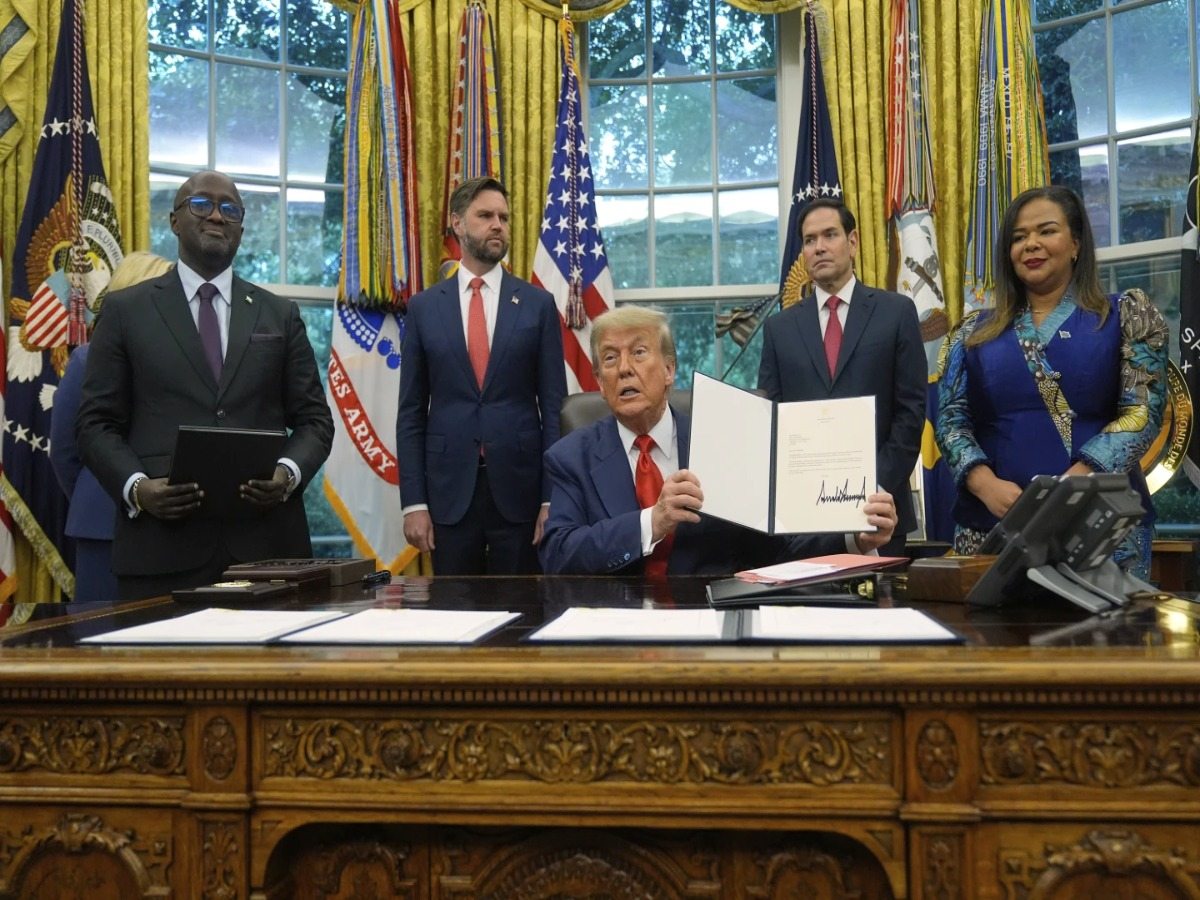After decades of brutal conflict in eastern Congo, a new peace accord signed between the Democratic Republic of Congo and Rwanda has stirred cautious hope for change. The deal, brokered by the United States and inked on Friday, aims to end ongoing hostilities and open up access for U.S. companies to the region’s vast untapped mineral reserves.
At the White House, President Donald Trump hailed the agreement as a landmark moment.
“Today, the violence and destruction comes to an end, and the entire region begins a new chapter of hope and opportunity, harmony, prosperity and peace,” Trump told the foreign ministers of both countries during a ceremonial meeting.
The agreement, finalized earlier at the State Department’s Treaty Room under a portrait of Colin Powell, was praised by Secretary of State Marco Rubio as a milestone moment after “30 years of war.”
Watch a recent episode of The BreakDown podcast below and subscribe to our channel PanaGenius TV for latest episodes.
Eastern Congo has long been the epicenter of one of the world’s deadliest conflicts, with over 100 armed groups, including the Rwanda-backed M23, entrenched in the region since the 1990s. Millions have died due to direct violence, famine, and disease.
Despite the accord, many experts remain skeptical. The M23 rebels, responsible for some of the most recent escalations, insist the peace deal doesn’t apply to them.
“Anything regarding us which are done without us, it’s against us,” said Corneille Nangaa, leader of the Congo River Alliance, which includes M23. His statement was echoed by M23 spokesperson Oscar Balinda, who reaffirmed the group’s exclusion from the agreement.
Rwanda’s Foreign Minister Olivier Nduhungirehe acknowledged the complexities, warning that uncertainty remains high.
“There is no doubt that the road ahead will not be easy,” he said. “But with the continued support of the United States and other partners, we believe that a turning point has been reached.”
Congo’s Foreign Minister Therese Kayikwamba Wagner offered a heartfelt call for accountability.
“Some wounds will heal, but they will never fully disappear,” she said. “Those who have suffered the most are watching. They are expecting this agreement to be respected, and we cannot fail them.”
While positioned as a peace initiative, the deal also serves U.S. strategic interests. With global demand soaring for rare earth elements and battery-grade minerals, the U.S. seeks greater influence over Congo’s estimated $24 trillion mineral wealth, currently dominated by Chinese firms.
President Donald Trump has made no secret of the motivation, emphasizing economic access while warning of harsh penalties for violations of the agreement.
READ ALSO: US pushes Rwanda-DRC peace deal amid rising tensions in Eastern Congo
“Very severe penalties, financial and otherwise,” he said when asked about the consequences for breaching the deal.
Congo is counting on U.S. military and security support to push back against rebel forces occupying key cities such as Goma and Bukavu. Rwanda maintains its troops are only defending national interests and denies supporting M23, though reports suggest up to 4,000 Rwandan soldiers remain inside Congo’s borders.
The roots of the conflict trace back to the 1994 Rwandan genocide, when more than half a million Tutsis were slaughtered. Fearing reprisals, nearly 2 million Hutus fled into Congo. Rwanda has long accused the Congolese military of sheltering genocidaires, fueling decades of instability in the eastern provinces.
So far, seven million people remain displaced, and the U.N. has labeled the crisis “one of the most protracted, complex, serious humanitarian crises on Earth.”
Despite the gravity of the crisis, the peace deal does not explicitly address war crimes or pathways to justice for victims. That omission has drawn sharp criticism from local experts.
“The current draft agreement ignores war crimes and justice for victims by imposing a partnership between the victim and the aggressor,” said Christian Moleka, a political analyst at Congolese think tank Dypol. “This seems like a trigger-happy proposition and cannot establish lasting peace without justice and reparation.”
On the ground in North Kivu, the region hardest hit, some view the deal as a potential breakthrough, but others remain wary.
“I don’t think the Americans should be trusted 100%,” said local activist Hope Muhinuka. “It is up to us to capitalize on all we have now as an opportunity.”
Both ministers praised the mediation role of Qatar, which hosted separate negotiations involving M23 and promised to help shape a future political settlement. Nduhungirehe also noted Rwanda’s decision to lift “defensive measures,” though it remains unclear if that includes withdrawing troops.
As U.S. government looks to counter China’s grip on Africa’s minerals, this agreement is being watched closely. While Congo’s Wagner called the U.S. a “reliable partner,” analysts caution that future American commitment may hinge on how much mineral access it can secure.
“So there is no doubt in this moment, if you want, when it comes to the credibility of the U.S. as a partner… be it for a peace process… or for investment,” she told the AP.










